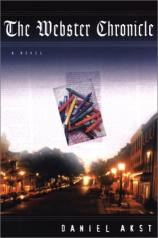The Webster Chronicle
Review
The Webster Chronicle
For the aspiring young reporter, the world of community newspapers seems like a strange alternate universe. Instead of writing about international arms treaties, high political scandal, or the film star du jour, you're stuck trying to find weighty words to describe a Girl Scout bake sale, a city council zoning debate, or the local junior high's production of Grease (with all the naughty stuff taken out, of course). Many a J-school graduate has been quickly disillusioned upon assignment of their first puff piece on a car dealership, supermarket, or real estate broker. They're what Akst calls the "holy trinity" of community newspapers everywhere, and not coincidentally usually the biggest advertisers.
But given the distance of time and experience, any Mencken wannabe will see the value of community newspapers and covering the events and people with more of a direct influence on one's life than what's going on across the state line or the nearest ocean. And it's that kind of newspaper that's at the center of this novel, under the stewardship of former big city reporter Terry Mathers, as editor, and his estranged wife Abigail, as publisher. Their floundering weekly seems destined for failure, with the hottest local story being the imminent takeover of the local department store by a Wal-Mart like national chain. But when a respected local day care becomes the target of a wild string of rumors concerning child abuse, it sets off a sense of hysteria in the town and its leading citizens --- and their paper, The Webster Chronicle, is ground zero for the story.
Taken as strictly that, this book had the potential to be an insightful and compelling novel. But Akst's weaknesses in plotting and characterization ultimately work against such literary ambitions. To begin with, the allegations against the day care --- initially made by town citizens with heavily compromised reputations of their own --- quickly escalate from a spanking incident to child sex, child porn, ritualism, and Satanism, with only the bizarre claims of three and four year olds --- highly suggested by the city's hired sexual abuse advisor --- to back them up. Mathers must be the most gullible journalist in the world, as he's all too eager to wholeheartedly accept the charges, in itself suspect since he also happens to be sleeping with the advisor. But since Abigail is also enjoying wild sex with the local department store owner...
The novel's biggest weakness, though, seems to lie with Akst's narrative indecision. Hanging somewhere between straight narrative and broad satire (it's no coincidence that some of the accused are also practicing Wiccans), it succeeds at neither. Having Terry's dad as a disapproving, Walter Cronkite-like broadcast journalist superstar seems like a blatant grab for another subplot. And Akst's character dialogue concerning child sexual abuse often reads like a propagandist textbook usually seen only in the poorer novels of Andrew Vachss. By the end, of course, Terry is repentant and abhorrent of the overheated (and, of course, unfounded) scandal that he has helped create, but his instant conversion rings false.
Thus, THE WEBSTER CHRONICLE takes a good and even tried idea for literature, and ultimately fails to deliver. There are many good points about the book, particularly how unsubstantiated gossip turns into truth, and how those who are not wholeheartedly with a "good" cause then must be seen as against it (woe be to the citizen of Webster not sporting a "Believe the Children" button). But overall, Akst's reach as an author exceeds his grasp as a writer --- with the same outcome, whether he'd been writing for The Webster Chronicle or The New York Times.
Reviewed by Bob Ruggiero on January 24, 2011
The Webster Chronicle
- Publication Date: January 1, 2001
- Genres: Fiction
- Hardcover: 311 pages
- Publisher: Bluehen Books
- ISBN-10: 0399148124
- ISBN-13: 9780399148125









